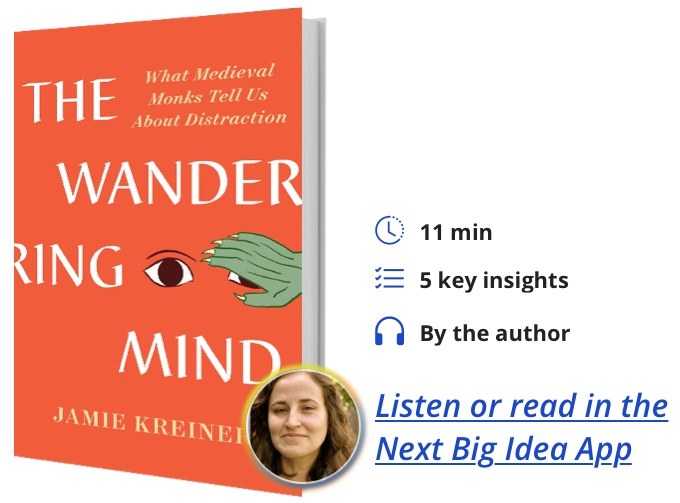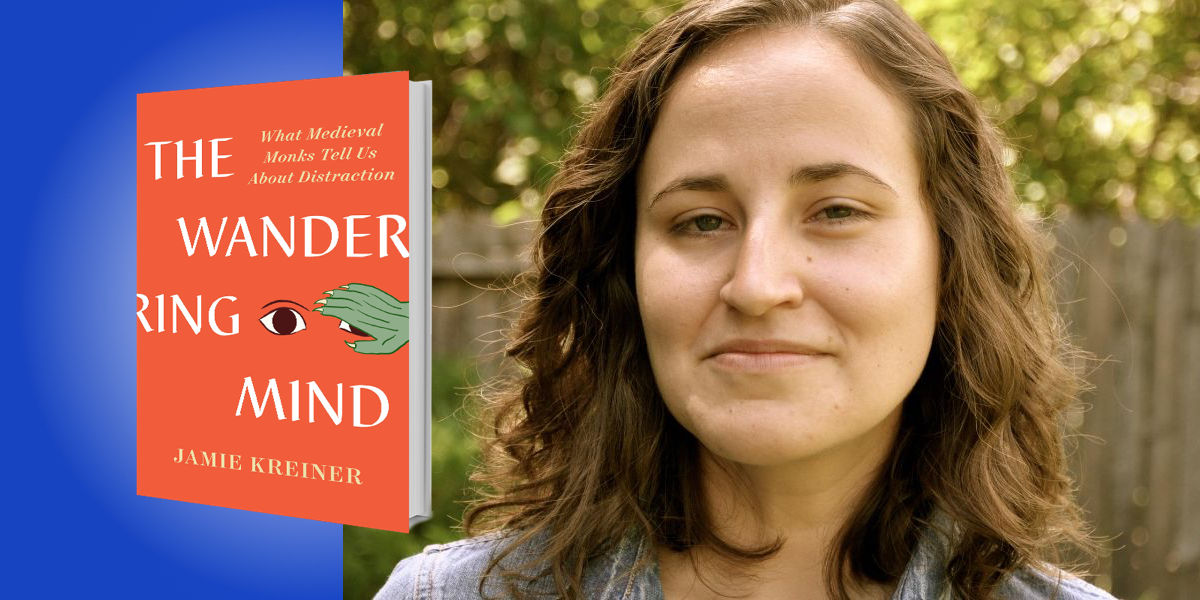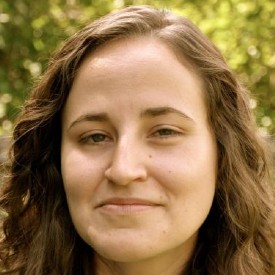Jamie Kreiner is a professor of history at the University of Georgia. The Wandering Mind is her first book.
Below, Jamie shares 5 key insights from her new book, The Wandering Mind: What Medieval Monks Tell Us About Distraction. Listen to the audio version—read by Jamie herself—in the Next Big Idea App.

1. We have things in common with people who are a world away from us.
The early Christian monks who lived in the Mediterranean, the Middle East, and Europe a millennium and a half ago spoke different languages than we do. They were subjects of empires; they didn’t have combustion engines or the internet; and they had chosen to dedicate themselves fully to a life of stretching out to God and reflecting on their moral obligations within a universe of divine making.
So there is a chronological and experiential gulf between us. But the monks also struggled with experiences that are all too familiar. They often got distracted, and that meant they were also often frustrated. They’d made a major life change and yet it hadn’t fixed everything. They still had to think about subsistence. They were interrupted by visiting pilgrims and fellow monks. And even when they were all alone and had time to think, they struggled to do what they very much wanted to do. They complained about information overload. Their eyes drifted off the page while they read and studied. Their minds meandered through the events of the day while they chanted psalms. They thought about dinner when they were supposed to be meditating.
These very human conflicts that we share help us relate to people who inhabited a distant time. But the differences between us are also very interesting.
2. Over the centuries we have lost valuable forms of knowledge.
Although early Christian monks struggled with distraction, they were also much more inventive than we are when it came to actually dealing with it. Even though they continually got frustrated, they saw it as their ethical obligation to keep working on their attentiveness to God.
“They explored mnemonic and meditational techniques to give their minds room to play while anchoring them in ideas that mattered.”
So they developed systems of communal organization that relied on social support to help each other stay disciplined. They analyzed the symbiotic relationship between their bodies and minds and trained them accordingly, in the domains of grooming, sleeping, sex, and eating. They experimented with book technologies to help fix their focus—but they also came up with ground rules to keep that tech from overwhelming them. They explored mnemonic and meditational techniques to give their minds room to play while anchoring them in ideas that mattered. And they practiced metacognitive techniques to keep tabs on the comings and goings of their attention. Some of their techniques have parallels now, and some are practiced in a vestigial way in nerdier corners of the present day. But on the whole, the monks’ efforts represent a wide range of practices and knowledge that we have mostly forgotten.
3. Modernity isn’t uniquely complex; the premodern world was complex, too.
Monks developed that range of tactics to combat distraction because they knew there wasn’t a single or simple fix for it. They knew that their minds were connected to complex environments. They were connected to the stimuli of a world that was always in flux, to competing value systems of honor, status, politics, wealth, family, friends, pleasure, and spirituality. They were connected to the experiences and knowledge of other people. They were connected to bodies that wanted and needed things. They were connected to culture, to the invisible communications of demons and angels and, ultimately, to God. So, of course, trying to discipline the mind with just one or two hacks wasn’t going to address its multi-vectored relationship with reality.
“The more realistic way of concentrating on what mattered was to respond appropriately to what the world threw at you.”
The complexity of the world also prompted lots of monks to point out that fully abandoning or escaping all the things that could lead to distraction wasn’t actually possible. The more realistic way of concentrating on what mattered was to respond appropriately to what the world threw at you. So for instance, although monks tried to avoid small talk because they worried it would make them scatterbrained, they knew it couldn’t be dodged entirely. A celebrated monk named Theodora was said to have advised, for example, that hearing small talk wasn’t in itself a problem, so long as a monk’s heart was still turned to God the whole time. She compared it to sampling a lot of different dishes at a banquet without enjoying any of the meal. That was a really charged analogy for Theodora to choose: eating was an extremely delicate subject in monastic culture, because although everyone had to eat, eating for enjoyment or getting full could catalyze the mind’s fall into total negligence and disarray. Theodora was saying, in other words, that monks were going to find themselves in difficult situations where they couldn’t fully disengage—but she was confident that they could draw on their emotional and intellectual resources to manage.
4. Even early monastic culture was heterogeneous and argumentative.
Christian monks in the early Middle Ages came to a consensus on the importance of concentrating on God and on the divine order of things, and they agreed that a battery of methods was necessary to deal with distraction. But they could not agree on the specifics. Some monks would have disagreed with Theodora’s optimism about tasting foods without enjoyment, for example, or her confidence in hearing small talk without getting hooked. And there were plenty of other unresolved questions besides those. Which sleeping regimen was, exactly, the best one? Should monks’ hair be shaved or long or short? How many hours a day should monks read before it becomes counterproductive? Was farming or trading inherently distracting, or was subsisting on the offerings of patrons worse?
Sometimes even in normative sources, when a monastic leader is writing to lay out his or her vision for an entire community, we glimpse moments of pushback from other monks. They wondered why they weren’t allowed to do something even if it wasn’t illegal. They argued that it was okay to get angry with each other sometimes because, they reasoned, even God got mad sometimes. They disagreed with rules against laughing in church and at dinner.
“They argued that it was okay to get angry with each other sometimes because, they reasoned, even God got mad sometimes.”
(That last objection was recorded by a bishop named Ferreolus of Uzès. He was writing for a community of monks in what’s now southern France who had probably been elite landowners in their previous lives, because he also emphasized that they weren’t allowed to go hunting anymore, or wear cologne, or complain about how they weren’t up to manual labor. In response to the monks’ objection about laughing, Ferreolus acknowledged that Jesus had laughed—but he didn’t laugh a lot—and that was the end of that.)
This insight about diversity and disagreement is especially important because it’s easy to think about other cultures in broad strokes, especially when these cultures are only accessible through old artifacts and documents. But even when we’re working with patchy evidence, it doesn’t take long to notice that perspectives and experiences varied widely, even at a single moment in time. A categorical term like “early Christian monks” conceals a lot of variation.
5. Stories are inspirational, but they are also partial.
Monks knew this better than anyone. They told and retold beloved accounts of heroic monks and also non-monks who lived like saints, who sat as still as statues, whose concentration never wavered, whose every decision and behavior embodied their values and commitment to God. They shared these stories to encourage and uplift each other. But they did this precisely because their own lives didn’t unfold so perfectly.
The monks wouldn’t have confused their hagiographies for reality; their stories were commentaries on reality. They were arguments for what really mattered, and for how things should be. It’s much harder all these years later to appreciate this, to pick apart how the things we read were responding to the world, not reflecting it back perfectly. Fortunately we have other sources to help reconstruct other pieces, other views, other aspects that monks’ own stories couldn’t fully capture.
Of course that’s true of the stories we write now, too. My book isn’t a complete history of the early Middle Ages. No single book can be. The best I can hope for is to use this single small subject of distraction to recover some of the ways that the past looks strangely modern, and how we, in some ways, are still strangely medieval.
To listen to the audio version read by author Jamie Kreiner, download the Next Big Idea App today:































